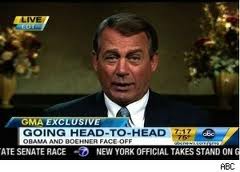Back in September, Rep. John Boehner (R-OH), now Speaker-elect, told Good Morning America he wanted to “pass a bill this month at 2008 spending levels – you know, before the TARP, before the bailouts, before the stimulus – and let’s put some certainty in the economy.”
He continued, “That in itself would save about 100 billion this year alone.”

Boehner didn’t get his wish of passing such a bill before the election. But he’s about to become Speaker of the House, and starting in January, it’ll be a whole lot easier to get his way.
The Pledge to America that Republicans signed onto during the campaign echoes Boehner’s spending-cut ethos:
With common-sense exceptions for seniors, veterans, and our troops, we will roll back government spending to prestimulus, pre-bailout levels, saving us at least $100 billion in the first year alone and putting us on a path to begin paying down the debt, balancing the budget, and ending the spending spree in Washington that threatens our children’s future.
In 2008 – the year Boehner mentioned to George Stephanopoulos – transportation spending levels were $41.6 billion for highways and $9.7 billion for transit. The TIGER program didn’t exist yet in 2008. High speed rail funding – already considered a likely first target for cuts – would be a goner for sure.
“If it’s going back to 2008 levels but the programs remain, that’s one thing,” said Will Schroeer, Policy and Research Director at Smart Growth America. “If it’s going back only to 2008 programs, then that would be much more problematic.”
Besides, if the Republicans want to roll spending levels back to 2008, they’re still going to be trapped in deficit spending.
“The 2008 budget levels for transportation exceed the revenues coming in to the highway trust fund,” said Joshua Schank, director of transportation research at the Bipartisan Policy Center. “So, what that would mean is that they’re going to be continuing to spend more than they’re taking in and continuing to increase the inevitable deficit that will come after the latest general fund infusion into the highway trust fund runs out.”
Schank says Rep. John Mica, the incoming Transportation Committee chair, doesn’t consider that kind of deficit spending viable.
Further, the 2008 transportation budget included earmarks. If the Republicans follow through with their earmark ban as promised, Schank said, “there’s going to be money flying around” to be used some other way.
“They’re not going to want to put it into discretionary programs that the executive can do something with,” Schank said. “So they’ll probably have to pump them into some existing program, and which ones they choose will be a battle.”
Either way, less federal transportation money – at a time of mounting demand for greater investments in infrastructure – will leave states with an even more disproportionate burden than before,
“Most state DOTs are in some stage of fiscal crisis right now,” Will Schroeer said. “This wouldn’t help.”





